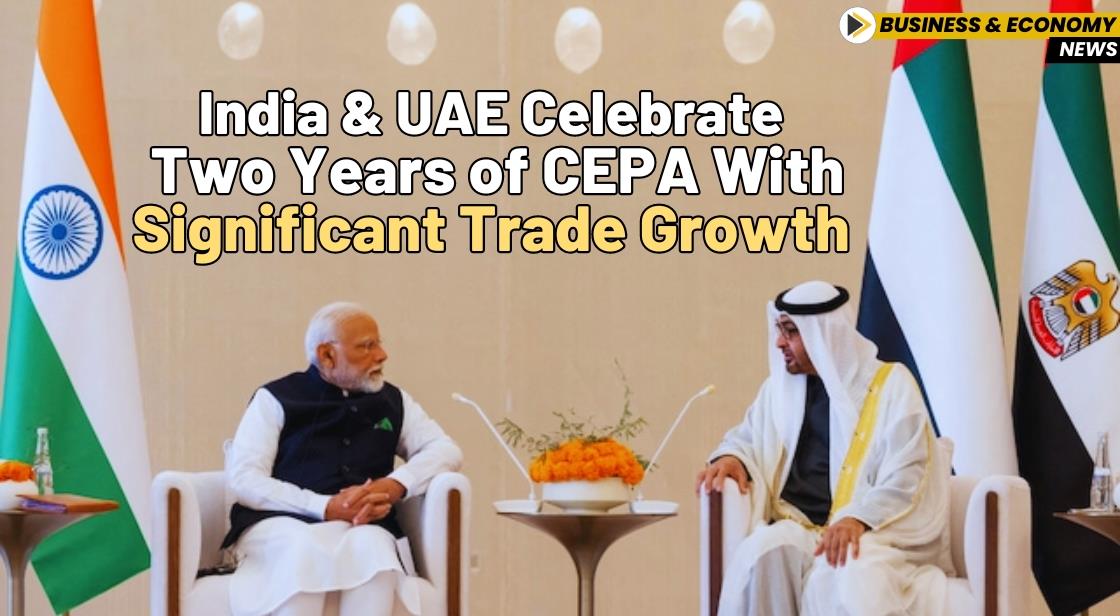India and UAE Celebrate Two Years of CEPA with Significant Trade Growth

News Synopsis
The Indian Business and Professional Council (IBPC) Dubai, in coordination with the Consulate General of India, hosted a grand event on September 6 to celebrate the second anniversary of the Comprehensive Economic Partnership Agreement (CEPA) between India and the United Arab Emirates (UAE). The event, held in Dubai, highlighted the significant milestones and achievements in trade and investment between the two countries since the agreement's implementation in May 2022.
Strengthening Economic Ties Through CEPA
In his opening remarks, Deputy Consul General of India, Yatin Patel, emphasized the transformative effect of CEPA on bilateral trade. He said, “The dynamic trade relationship has contributed to stronger and more diversified supply chains. Trade, which was once concentrated in the energy sector, has now spread across various other sectors, strengthening our supply chains. Additionally, the transfer of technology has been facilitated, thanks to increased business interactions, and we’ve seen advancements in skill development. The emergence of new sectors has also led to further trade facilitation and talent growth.”
This statement underlined how CEPA has been instrumental in broadening trade relations between the two nations, moving beyond traditional energy-based commerce into diverse sectors, thereby enhancing the resilience of supply chains and fostering technological collaboration.
Key Successes and Economic Growth Since CEPA’s Inception
The Comprehensive Economic Partnership Agreement has played a pivotal role in boosting trade between India and the UAE. Over the past two years, CEPA has expanded its impact across multiple sectors and over 100 subsectors. The agreement is now seen as a cornerstone of economic cooperation between the two nations, facilitating trade in areas such as technology, manufacturing, services, and consumer goods.
Ahmed Aljeibi, Director of the UAE-India CEPA Council, presented key statistics reflecting the positive outcomes of the agreement. He reported, “Over the past two years, total trade has increased by nearly 15%, with the UAE’s exports rising by over 7%, and Indian exports to the UAE growing by an impressive 27%.” Aljeibi’s remarks highlighted CEPA’s role as one of the most significant free trade agreements signed by India, further strengthening the complementary nature of the two economies.
Diversification of Trade Beyond Hydrocarbons
A notable post-CEPA development has been the diversification of trade beyond hydrocarbons. Aljeibi added, “Non-oil trade between the UAE and India registered a 20% increase during the 2023-2024 financial year, highlighting the transformative potential of CEPA.” This shift signals a broader economic engagement, with trade expanding into areas such as renewable energy, technology, healthcare, and consumer products.
CEPA’s Impact on Investments and Business Expansion
The India-UAE CEPA has also triggered significant investment flows between the two countries. French investment firm Christensway recently committed $525 million to Tata Power Renewables in India, a testament to the growing confidence in India's renewable energy sector. Additionally, DP World signed a Memorandum of Understanding with the Gujarat government to invest $3 billion in new ports and terminals, further deepening economic ties.
From the Indian side, there has been a notable uptick in Indian companies registering and expanding operations in the UAE. This reflects a growing interest in the UAE market, encouraged by the favorable business environment and investment opportunities facilitated by CEPA.
Panel Discussion on Sector-Specific Benefits of CEPA
The celebratory event also featured an insightful panel discussion moderated by Sreekumar Brahmanandan, Investment Director at Dubai Investments PJSC. Panelists included prominent business leaders such as Marwan Abdulaziz, Senior Vice President of Dubai Science Park; Rishi Chadha, Vice President & Head-MENA of Tata Consumer Products Ltd.; Aditya Singh, Head of Jewellery International Business at Titan; and Dr. Rajesh Agarwal, Executive Director of RMZ Group.
The discussion explored how CEPA has benefited various sectors, from technology and manufacturing to consumer goods. The panelists shared their experiences on how the agreement has enhanced technology transfers, fostered skill development, and created demand for new talent in emerging sectors. The consensus was clear: CEPA has played a vital role in strengthening and diversifying supply chains, benefiting both nations.
Cultural and Economic Integration through CEPA
Sahitya Chaturvedi, Secretary General of IBPC Dubai, emphasized that CEPA extends beyond trade and investment, incorporating cultural and financial connections between the two nations. “The provisions in India-UAE CEPA incorporate economic, financial, and cultural connections between the two nations,” he said, underscoring the comprehensive and far-reaching impact of the agreement.
Future Outlook: Capitalizing on CEPA’s Success
As the India-UAE CEPA enters its third year, both nations are keen to further capitalize on the successes achieved so far. The CEPA Council, launched at the Vibrant Gujarat Summit in January 2024, has been working closely with over 500 businesses across seven Indian states over the past nine months. The council is focused on addressing challenges and ensuring that businesses in both countries maximize the benefits offered by the agreement.
Looking ahead, CEPA is poised to serve as a model for future international trade partnerships. Its success demonstrates the potential for deeper economic integration and mutual prosperity between nations, particularly in a rapidly evolving global economy. This aligns with initiatives like "Visit Bharat," which seek to further elevate India’s presence on the global stage.
You May Like









